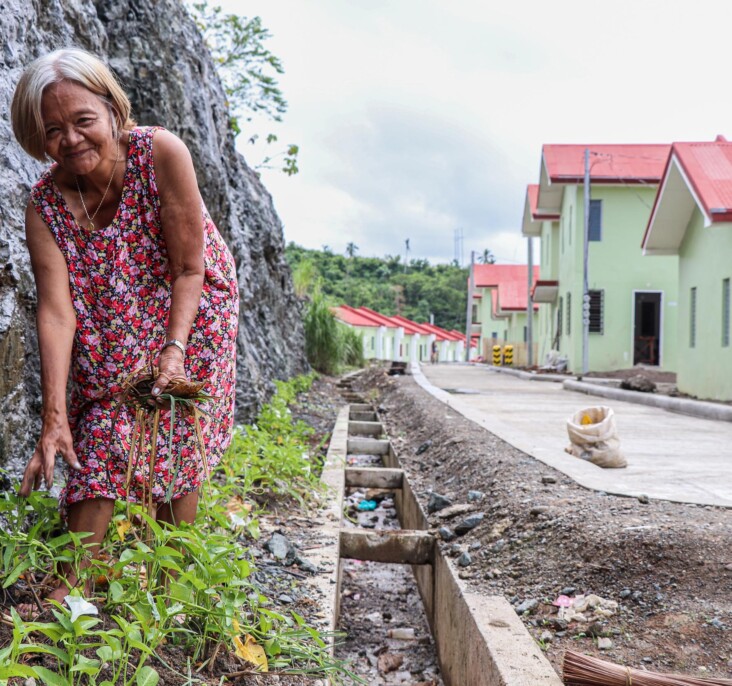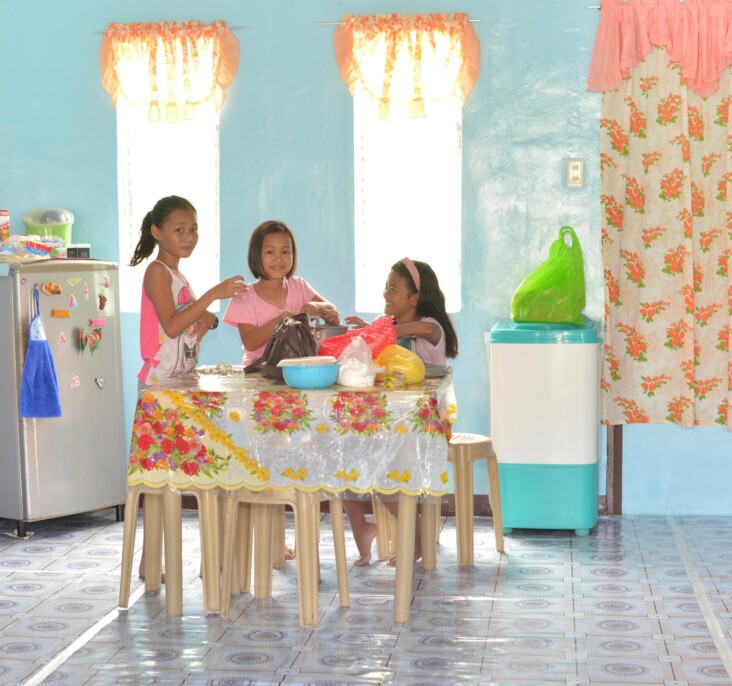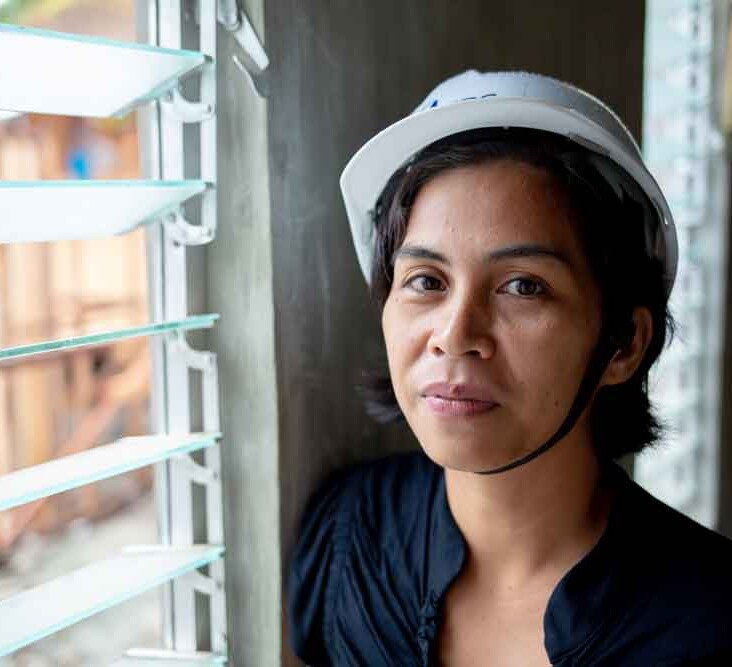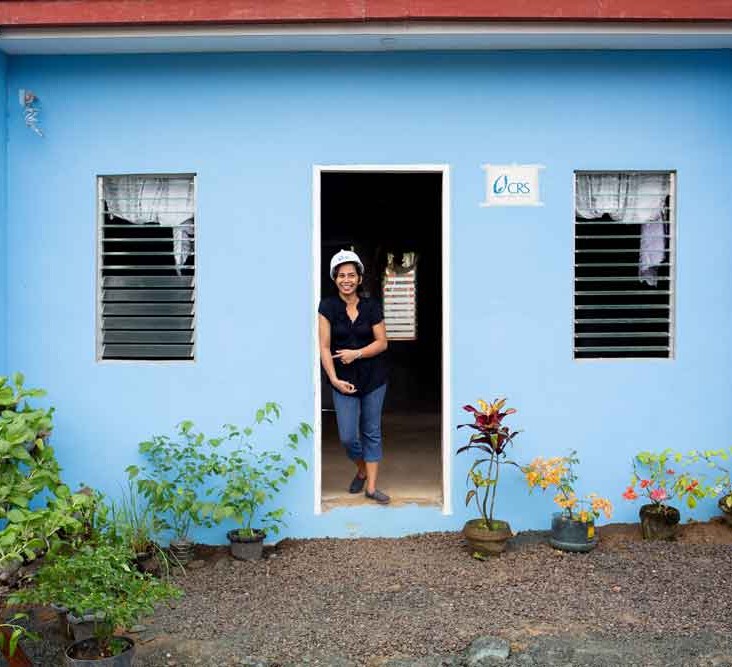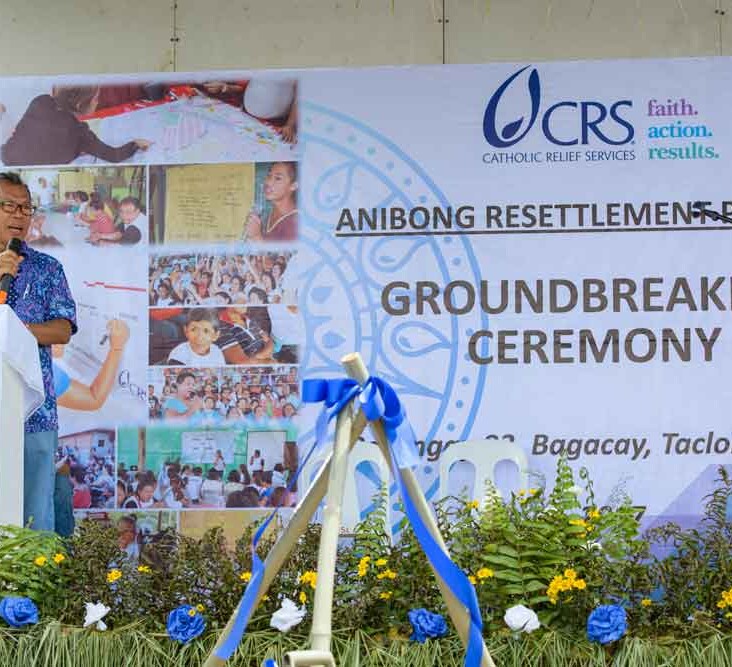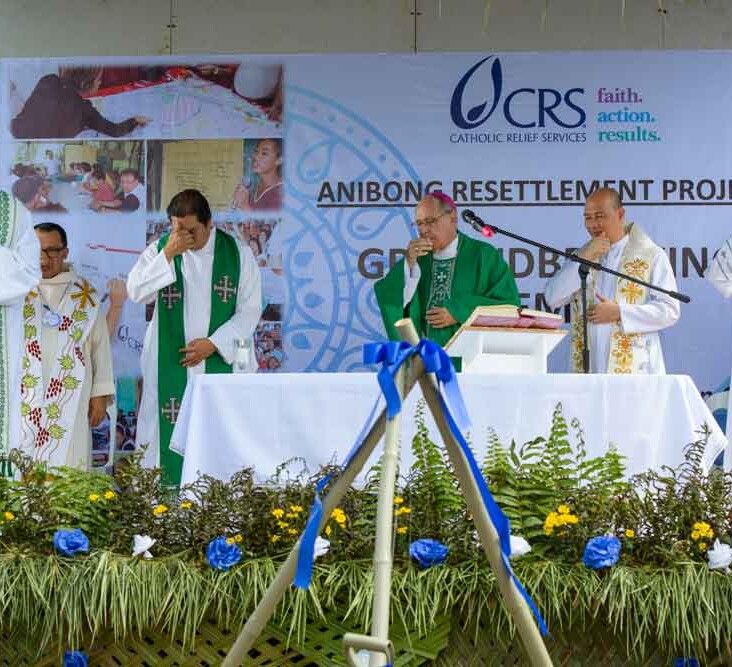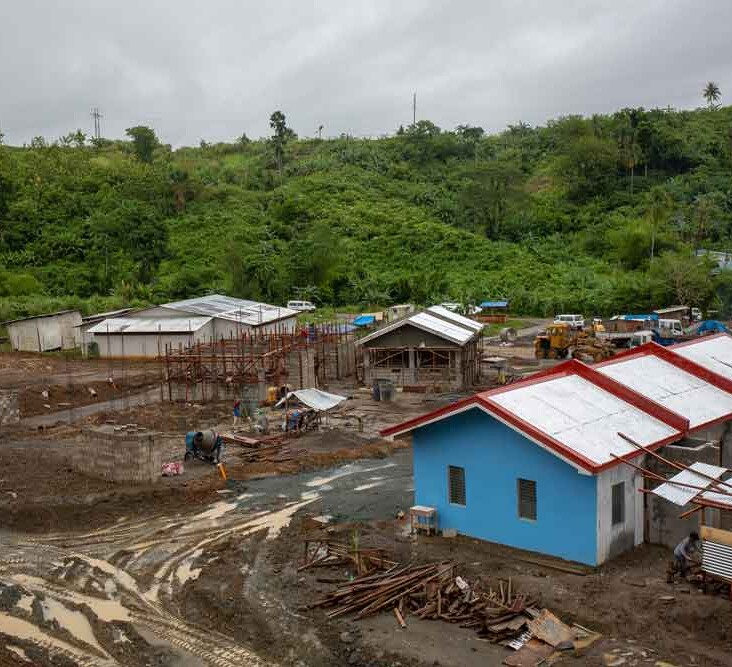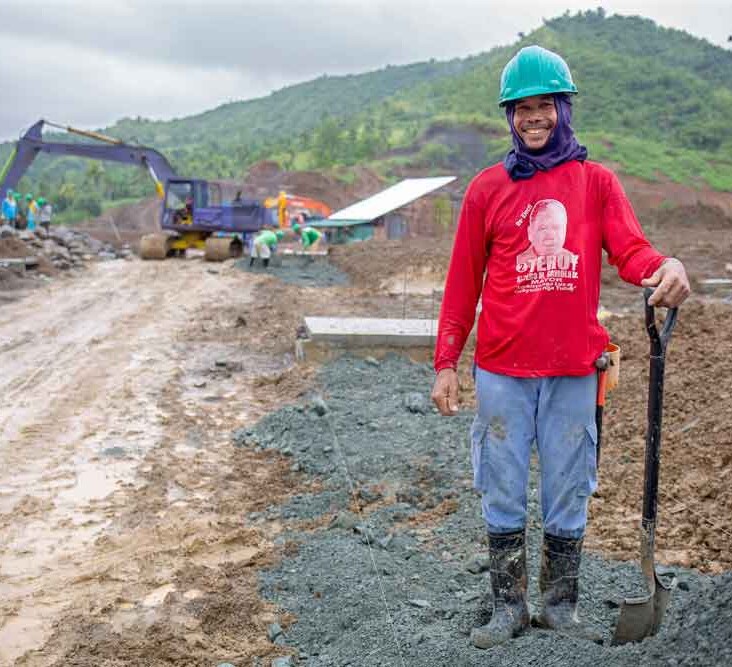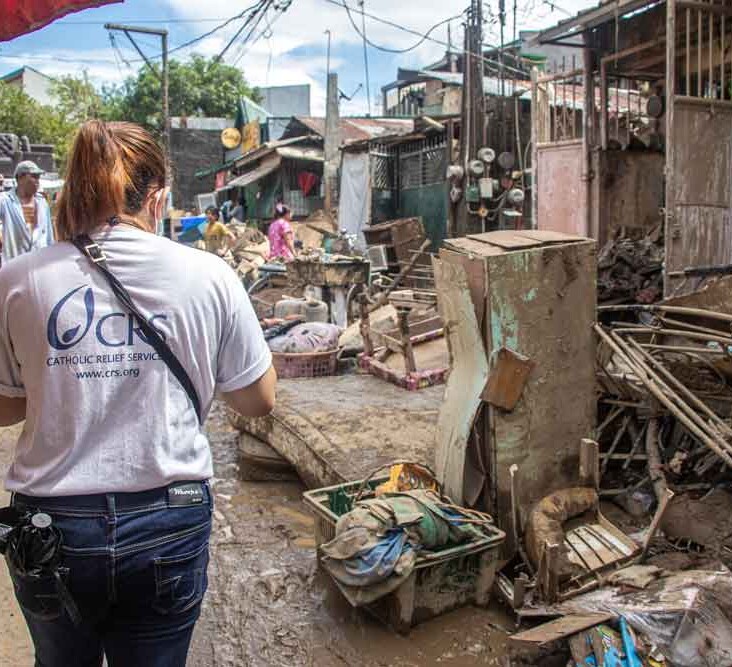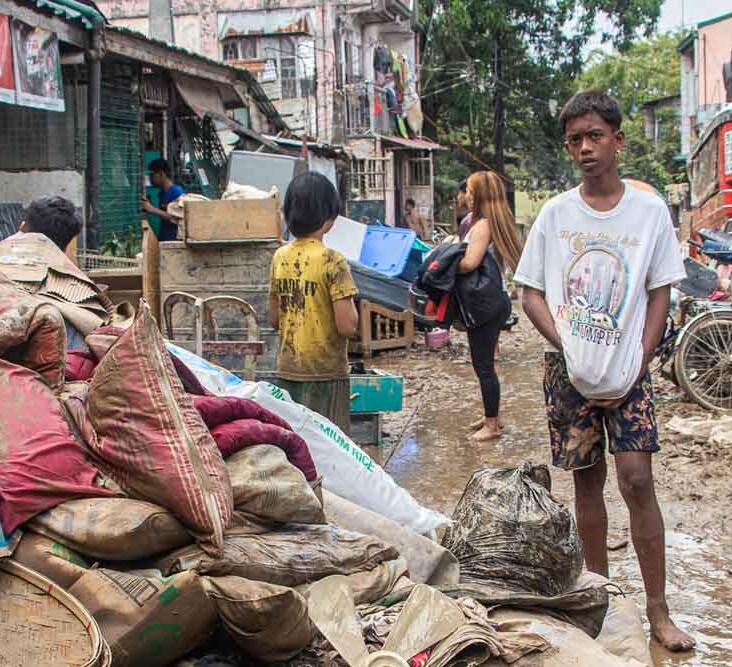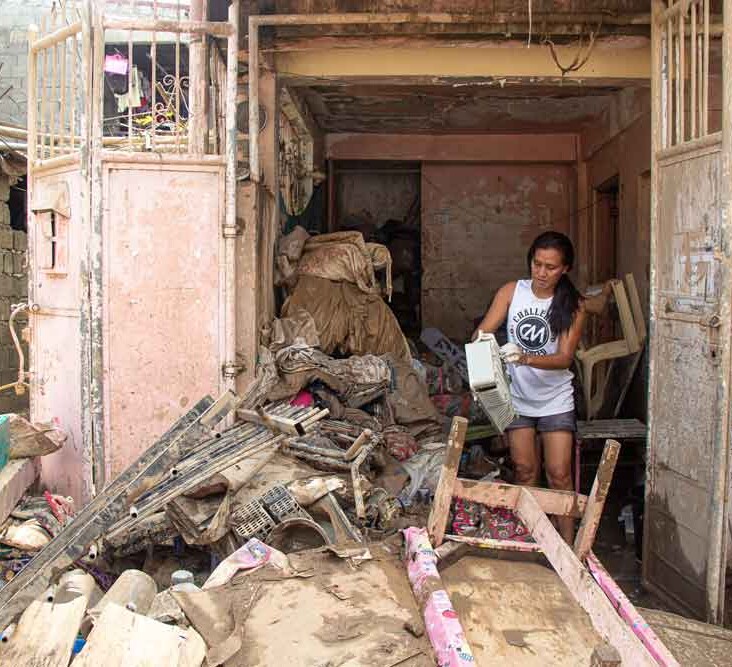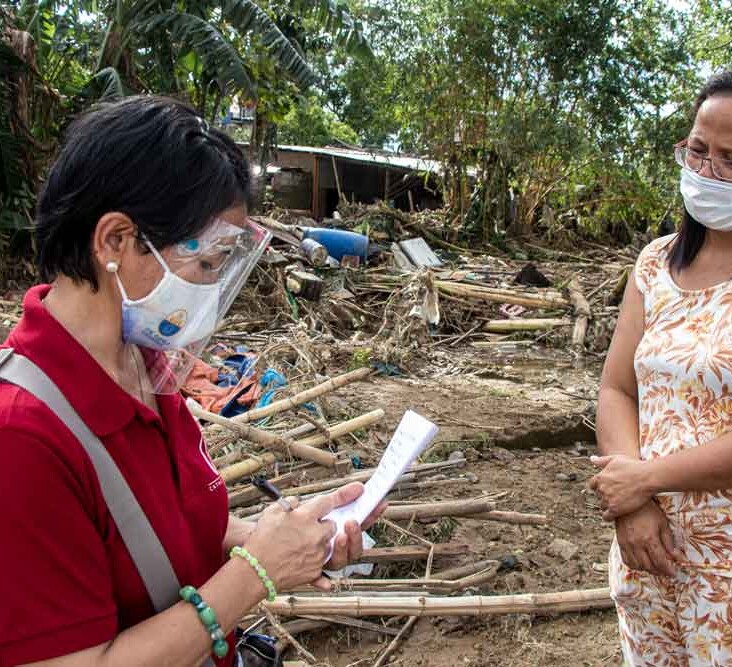In her new neighborhood, 37-year-old Girli Ascalona lives in a home of her own. Her six children enjoy fresh food from their garden, running water, electricity and most importantly, safety. Girli’s home is resilient enough to withstand natural disasters like Typhoon Haiyan, which destroyed her former home in Anibong in 2013. “My children will always have a place to call home,” Girli says proudly. “I can now focus on my kids,” she says, rather than just on survival.
Typhoon Haiyan affected 14 million people in the Philippines—killing 6,000 and destroying more than one million homes. Along the coastal district of Anibong in Tacloban City, damage was so severe that the Philippine government declared it unsafe and slated all informal housing for demolition. With support from our donors, Catholic Relief Services was able to relocate 883 families from Anibong to Dreamville, a new community where residents live in their own permanent and dignified homes.
CRS works in close collaboration with program participants to develop programming that meet their needs. Beginning in May 2014, we worked alongside families from Anibong to design and construct Dreamville.
Dreamville is located 4.5 miles from Anibong and is close to public transportation. It includes essential infrastructure and services—from water, sanitation, electricity, drainage and waste management, to markets and shared spaces. CRS also worked with the city’s education department to build a new, multi-story, 40-classroom school staffed with full-time teachers.
Pandemic Pressures
In March 2020, CRS began working in partnership with the Tacloban City government to move families into Dreamville. But shortly thereafter, the COVID-19 pandemic began. On March 20, CRS was given 24 hours’ notice that the city would go into total lockdown to prevent the spread of coronavirus. At the time, families in Anibong were living in a community of crowded makeshift houses, where any incidence of infection could be catastrophic. Relocation could not wait.
Thanks to a heroic eight-hour effort, we were able to relocate nearly 100 of the most vulnerable families from Anibong to Dreamville before lockdown. Each family was equipped with essential living supplies to stay safely in their new homes for one month.
Today, Dreamville is thriving. Families have decorated their homes, markets offer fresh fish and vegetables, and children play. Residents also wear face masks and practice physical distancing to prevent the spread of COVID-19. Dreamville resident Gloria Monteroso, 75, tends to her sweet potato and chili plants every morning with gratitude for her new daily routine. “After the typhoon, CRS assisted us and now we are blessed with a new house on land that is ours. I couldn’t ask for more.” Eleven-year-old Gio adds, “We really love it here! There’s wide-open space to run and play.”
A sustainable community requires sustainable self-governance. Resident families democratically elected homeowners’ association members, who were then trained and mentored by CRS. The association’s leaders are now successfully managing Dreamville—providing security, answering questions and concerns, managing the budget, coordinating with relevant government agencies and monitoring water distribution.
Typhoon Season 2020
The pandemic wasn’t the only hardship the Philippines faced in 2020. With wind speeds of 195 miles per hour, Super Typhoon Goni slammed into the Philippines on November 1. Said to be the strongest since Typhoon Haiyan, Goni destroyed homes and land, displacing families as emergency teams helped with evacuations as fast as possible—all during a global health crisis.
And then it happened again. Typhoon Vamco hit the Philippines just one week after Typhoon Goni devastated communities.
At a Category 4, Typhoon Vamco triggered extensive flooding in several areas, including Metro Manila, leading to increased hardships and further displacement for families. Heavy rains affected the region previously hit by Typhoon Goni, damaging newly repaired homes.
CRS’ emergency work has two phases: preparation and response. Since 2015, CRS has been investing in disaster preparedness in the region, improving family resilience to natural disaster and strengthening local government capacity. CRS installed five emergency sirens in high-risk municipalities, which were used during the recent typhoons to aid in warning and evacuation.
Still, thousands of homes were damaged or destroyed by the year’s storms. CRS and partners Caritas Virac and Social Action Center of Legazpi provided tarps, shelter tool kits, and hygiene and water kits to thousands of families. These relief and recovery efforts all happened with safe COVID-19 protocols in place.
The Key Approaches to Driving Mission Agility
Our work with Filipino communities exemplifies the strategies of our Driving Mission Agility work. Responding immediately and effectively to emergencies like the typhoons that struck the Philippines in 2020 is central to our mission. And it is private donors who drive mission agility. Our flexibility and rapid response are enabled by support for this core function: bringing relief to those in crisis.
While CRS carefully stewards all gifts, the flexibility of unrestricted support allows us to innovate, leverage and partner in ways that maximize efficiency and impact—and operate at our best. We fulfill our mission through five key approaches.
CRS is not afraid to use groundbreaking methods and technologies. We advance innovations that reduce costs and errors, while expanding opportunities. We keep overhead costs minimal by leveraging resources around the world. Approximately 92% of expenses go directly to programs serving people in need. Such efficiency is possible because unrestricted gifts allow us to leverage public funds through private support.
As we did this year, in the Philippines specifically and to prevent the spread of COVID-19 around the world, we act quickly. We respond immediately to emergencies, without waiting for public funding or attention. We also pre-position supplies and work with high-risk regions to prepare for the worst. This planning saves lives.
CRS is welcomed into remote communities because of the trust we have built over 75 years. Through our network of 2,000 Church and secular partners, CRS is in the unique position to turn its values into action. We partner for good.
Finally, we can reach and sustain a presence in some of the most isolated and challenging environments. These are places where others do not go—places that restricted public funding often does not reach. Our longstanding presence and partnerships build the trust that underpins sustainable transformation. Together, we create lasting change.
Going Further
Today, CRS continues to support people with disabilities and workers in the informal economy as the community quarantine continues to affect their livelihoods and access to food. “We are focusing our efforts on assisting the most vulnerable populations who bear the brunt of the lockdown and are at the greatest risk from the spread of COVID-19,” says Matthew McGarry, who was CRS sub-regional country representative for the Philippines when the emergencies of 2020 hit. “Beyond the dangers of the disease itself, the current situation makes it virtually impossible for many families to meet their most basic needs.”
We are using remote consultations to interact with residents of residential facilities for people with disabilities to secure food and other necessities they select. We are working with Caritas in the Philippines to provide cash grants to more than 150 workers so they can buy food and other necessities. “I used to earn seven dollars a day, but since the lockdown I have been relying on my siblings’ help to feed my three children,” says Pablito Velasquez, a motorcycle taxi driver in the Philippines who received a cash grant. “With this money, I will be able to buy rice and food supplies for my family.”
We are living in a pivotal moment. As COVID-19 exacerbates the plight of our most vulnerable sisters and brothers, we must go further than ever before. Because we should, and because, with your support, we can.
